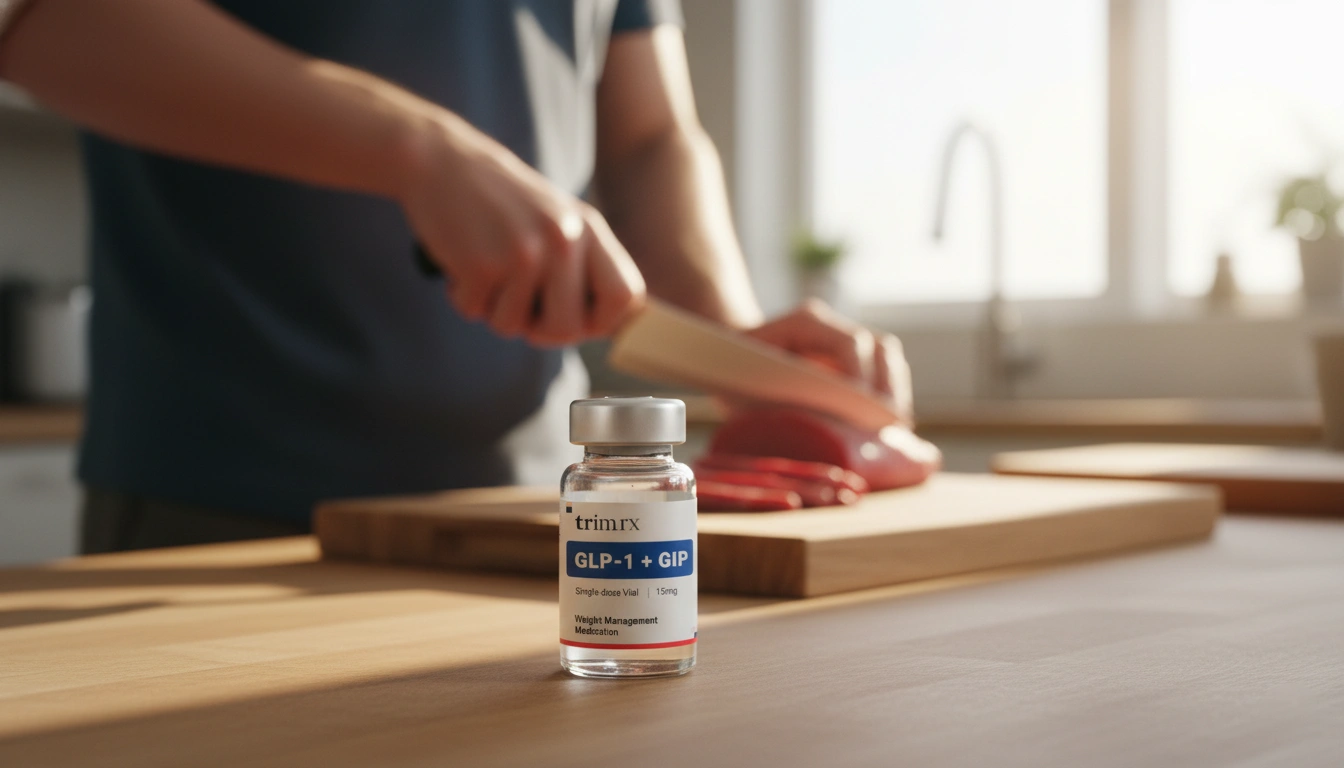How Much GLP-1 Should I Take? A Comprehensive Guide to Dosing for Weight Loss

Introduction
Did you know that as many as 42% of adults in the United States are classified as obese? With this growing epidemic comes an increasing interest in effective weight management solutions, particularly GLP-1 receptor agonists. These medications, such as semaglutide and liraglutide, have gained attention for their ability to assist individuals in managing their weight effectively. If you’re considering these treatments, you might be asking, “How much GLP-1 should I take?”
In this blog post, we will delve into the specifics of GLP-1 medications, including their mechanisms of action, recommended dosing schedules, potential side effects, and how to maximize their effectiveness. Our goal is to equip you with a comprehensive understanding of GLP-1 therapy so that you can make informed decisions about your weight loss journey.
At TrimRx, we believe in the power of personalized medicine, combining advanced medical science with empathetic, individualized care to help you achieve sustainable weight loss. By the end of this article, you will have a clearer picture of how GLP-1 medications work and how to determine the right dosage for you.
Understanding GLP-1 Medications
What Are GLP-1 Receptor Agonists?
GLP-1 receptor agonists are a class of medications designed primarily to manage type 2 diabetes and obesity. They mimic the action of the glucagon-like peptide-1 hormone, which is naturally released in response to food intake. This hormone has several critical roles, such as stimulating insulin secretion, suppressing appetite, and slowing gastric emptying.
How Do They Work?
When you take a GLP-1 medication, it binds to GLP-1 receptors in the body, leading to increased insulin production and reduced glucagon secretion. This process helps lower blood sugar levels and promotes a feeling of fullness, which can lead to reduced calorie intake.
In clinical studies, GLP-1 medications have demonstrated effectiveness in helping individuals lose weight, with participants often achieving significant reductions in body weight when combined with lifestyle modifications such as diet and exercise.
FDA-Approved GLP-1 Medications
Several GLP-1 receptor agonists are available on the market, including:
- Semaglutide (Wegovy, Ozempic)
- Liraglutide (Saxenda)
- Dulaglutide (Trulicity)
- Tirzepatide (Mounjaro)
These medications are typically prescribed for individuals with a body mass index (BMI) of 30 or greater or 27 or greater with weight-related health conditions.
Dosing Guidelines for GLP-1 Medications
Initial Dosing and Titration
The dosing regimen for GLP-1 medications varies based on the specific product and individual patient needs. For instance, semaglutide for weight management starts with an initial dose of 0.25 mg once a week. This low starting dose allows your body to adjust to the medication and helps minimize side effects.
After four weeks, the dose can be increased to 0.5 mg. If well-tolerated, it can continue to be escalated to 1 mg, 1.7 mg, and finally to a maintenance dose of 2.4 mg once a week. This gradual increase is essential to avoid gastrointestinal discomfort, which is a common side effect of GLP-1 medications.
Example Dosing Schedule for Semaglutide
- Week 1-4: 0.25 mg once weekly
- Week 5-8: 0.5 mg once weekly
- Week 9-12: 1 mg once weekly
- Week 13 onward: 2.4 mg once weekly (maintenance dose)
Dosage Adjustments
It’s crucial to work closely with your healthcare provider when determining the appropriate dosage for your individual needs. Some factors influencing dosage adjustments might include:
- Tolerance: If you experience side effects like nausea or vomiting, your healthcare provider may recommend staying at a lower dose for an extended period before increasing.
- Weight Loss Goals: Your healthcare provider will consider your specific weight loss goals and overall health when determining the right dose.
- Combination with Other Medications: If you’re taking other medications that affect blood sugar levels, adjustments may be necessary.
Missed Doses
If you miss a dose of your GLP-1 medication, take it as soon as you remember, provided it’s within a few days. If it is almost time for your next scheduled dose, skip the missed dose and resume your regular schedule. Do not double up on doses.
Maximizing Weight Loss with GLP-1 Medications
While GLP-1 medications can be highly effective, their success is significantly enhanced when combined with healthy lifestyle choices. Here are some strategies to maximize your weight loss journey:
Diet and Nutrition
- Balanced Diet: Focus on a balanced diet rich in whole foods, including plenty of fruits, vegetables, lean proteins, and whole grains. This not only supports weight loss but also ensures you receive essential nutrients.
- Portion Control: Monitoring portion sizes can help with managing calorie intake, making it easier to maintain a caloric deficit.
Exercise
Regular physical activity is vital for weight loss and overall health. Aim for at least 150 minutes of moderate-intensity exercise each week, along with strength training exercises twice a week.
Regular Healthcare Consultations
Engaging with your healthcare provider for regular check-ups is vital for monitoring your progress and making necessary adjustments to your treatment plan. They can provide guidance on managing side effects, optimizing your weight loss strategy, and ensuring that you receive the most benefit from your GLP-1 medication.
Potential Side Effects of GLP-1 Medications
Though GLP-1 medications can be effective, they may also cause side effects. The most common side effects include:
- Nausea
- Vomiting
- Diarrhea
- Constipation
- Abdominal pain
These side effects tend to diminish as your body adjusts to the medication. If side effects persist or worsen, it’s essential to discuss them with your healthcare provider.
Long-Term Considerations
Is GLP-1 Therapy Right for You?
While GLP-1 medications have shown significant promise in weight management, they may not be suitable for everyone. Discussing your medical history and any existing health conditions with your healthcare provider is essential for determining if GLP-1 therapy aligns with your weight loss goals.
Sustainable Weight Management
It’s important to understand that weight loss is a journey that often requires ongoing support and lifestyle modifications. Many individuals may regain weight after stopping GLP-1 therapy, which is why integrating healthy habits into your daily routine is critical for long-term success.
Conclusion
GLP-1 medications like semaglutide and liraglutide offer promising solutions for weight management, but their success relies on the right dosing strategy and the incorporation of healthy lifestyle changes. By understanding how GLP-1 medications work, determining the appropriate dosage, and committing to a balanced diet and exercise regimen, we can navigate the path toward sustainable weight loss together.
Are you ready to take control of your weight loss journey? At TrimRx, we provide personalized weight loss solutions, including a free assessment quiz to help you determine your eligibility for prescription medications like semaglutide.
Take the first step today by completing our quiz here.
Additionally, we offer quick-access supplements such as GLP-1 Daily Support and Weight Loss Boost to support you on your journey.
FAQ
What should I do if I miss a dose of my GLP-1 medication?
If you miss a dose, take it as soon as you remember within a few days. If it’s close to your next dose, skip the missed dose and continue with your schedule. Do not take two doses at once.
How long does it take to see results from GLP-1 medications?
Many individuals begin to notice weight loss within the first few weeks of treatment, with more significant results often seen after three months of consistent use.
Can I take GLP-1 medications alongside other weight loss treatments?
It’s essential to consult with your healthcare provider to determine the best approach for combining treatments, as they can help tailor a plan that suits your unique needs.
Are there any long-term effects of using GLP-1 medications?
While GLP-1 medications can be effective, long-term use should be monitored by a healthcare provider to manage any potential side effects and ensure that weight loss strategies remain effective.
How do I know if GLP-1 therapy is right for me?
A thorough discussion with your healthcare provider, including your medical history and weight loss goals, will help determine if GLP-1 therapy is appropriate for your situation.

Transforming Lives, One Step at a Time
Keep reading
Vitamin B12 and GLP-1 Medications: What to Know
GLP-1 medications can lower B12 absorption and intake; learn symptoms, food sources, supplement options, and how to monitor levels.
Semaglutide Injection Site Reactions: What To Know
Learn why semaglutide injections can cause redness, swelling or nodules, how to prevent and treat them, and when to seek medical care.
TrimRx vs Friday’s
Compare TrimRx and Friday’s telehealth GLP-1 weight-loss programs: pricing, medical support, coaching, delivery, and which fits your needs.



